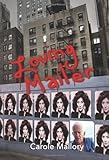HOT TOPICS: Alcoholism Addiction AA Cocaine Heroin
Remembering the Robin Williams I Knew
He was a friend decades ago, then our lives took different, but parallel paths. A few memories from afar . . .

shutterstock
While realizing I was two days early for a screening at the King of Prussia Imax in suburban Philadelphia, my phone rang and my cousin said, "I read you knew Robin Williams."
"Yes," I said. "Why?"
"Well, he died."
"No. You know he was one of us." My cousin is also sober. "Was it his heart?"
"They're saying self-inflicted."
"Oh, no," I said, collapsing as I hung up. I had to get home. I had to write about Robin. The Robin I knew. If ever briefly. But I knew him well. Long ago.
I felt that a part of him resented having to be 'on' so much of the time.
It was the late 1970's, those Mork and Mindydays, and we were in Harvey Lembeck'scomedy workshop. Yes, we were classmates. Robin would just jog into our Saturday morning class which had the likes of John Ritter, Marylou Henner and Alana Hamilton Stewart, and strut his wonderful comedic stuff. Then he would leave us laughing and jog out again. He would work his material out on our class as though he was having a tennis volley with words.
One morning, I had the good fortune to meet him, to go to dinner with him, and to become intimate with him for a short time. What did we have in common besides laughing? Cocaine. This was my alcoholic bottom and I was enjoying getting high with the help of alcohol and coke. And Robin was, too. How sad we were.
I remember how insecure he was once the laughter died down. He was sad and I was sad and we shared our sadness together. He was not a funny person when he was not "on." And I felt that a part of him resented having to be "on" so much of the time. To become a success. To be accepted. To be loved.
Several years before, I had dated Peter Sellers and Robin Williams' tendency towards depression reminded me of Peter Sellers who was filled with self-loathing.
As absurd as it now seems, Robin and I performed at the Comedy Store at the same time. I performed with the class, but, of course, Robin was the draw and did his solo standup routine, and was wonderful. Up and coming and out there. But inside tormented. He was not forthcoming with his feelings. In fact, he never discussed them. Neither did I. We were both emotionally frozen with our real feelings buried deep within. I did not know about feelings until I became sober.
For instance, I always thought Robin was handsome, but he felt ashamed of an aspect of his looks.
When I became sober in 1980, I wanted to reach out to him to try to carry the message, but he was too famous by then to communicate with. When he was 12-stepped—that is, helped by sober alcoholic/addicts who brought him to the sober rooms—I cheered inside. I was thrilled for his new lease on life, and the thought that now his comedy would be safe, and he would live a long healthy and, finally, happy life.
Then I read he had checked himself back into a rehab though he had many years of sobriety. 'Uh oh,' I thought. Then I read he had had a heart attack. Not good, I thought. Not good at all.
Sometimes fame makes it so difficult for the famous to cope with sobriety. And very recently I read he was back in rehab again.
Tonight, as I watch news of his passing, I will never forget the joy our class in comedy improvisation had watching Robin Williams work out his comedy muscles; his new material; his generosity in wanting to make us all laugh, while inside dearest Robin was not laughing at all.
Carole Mallory is a writer and actress from Philadelphia. She appeared in The Stepford Wives, among other films. She has written for Esquire, Elle and Playboy and is the author of Loving Mailer and Picasso's Ghost and teaches creative writing.








